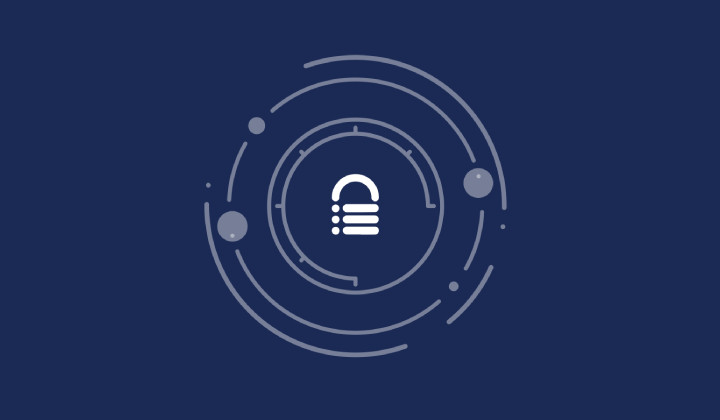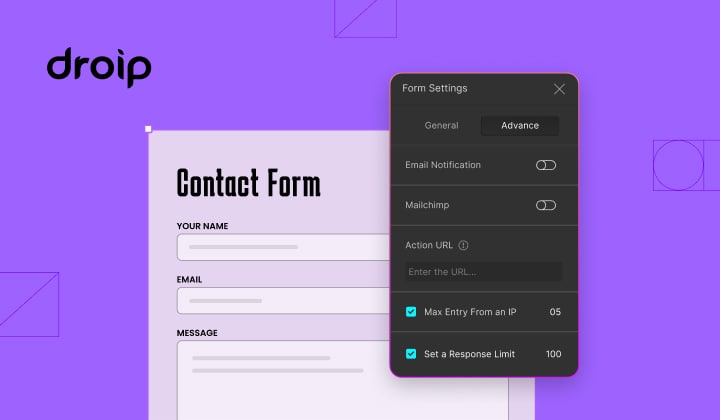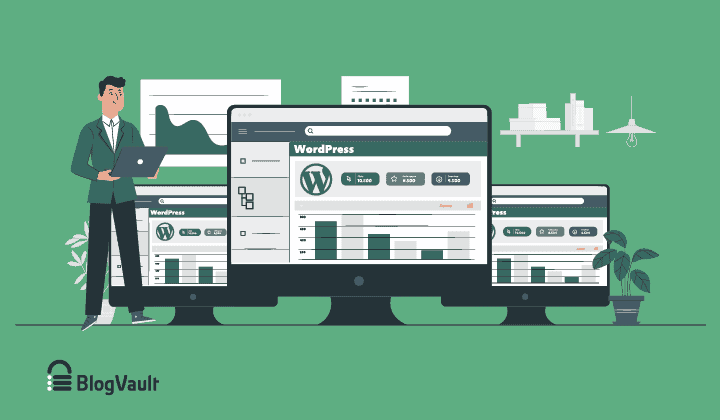Should You Rely on WordPress Backups by Your Web Hosts?
Bulletproof Backups for Your WordPress Website
Fortify your business continuity with foolproof WordPress backups. No data loss, no downtime — just secure, seamless operation.

Making WordPress backups with your WordPress hosting service seems like a convenient option. Here’s what you should know about backing up with your web host(s) and why you shouldn’t do it.
Making WordPress backups with your web host may be an option you are considering or are currently following. The idea is instantly attractive as your web host also backs up your WordPress site(s).
However, have you considered why web hosts also provide backups? It is because backups are a basic necessity for most modern day WordPress sites.
Hosting a WordPress site– the act of choosing a host and a plan, may be simple, but maintaining a site and ensuring uptime and quality user experience for visitors to your WordPress site is more difficult. Many things can go wrong with your WordPress site.
WordPress users know that everything from simple updates to hacking may crash your site or cause serious functionality issues. Having a backup can allow you to sort out the issues offline while your users continue to have a good experience and your reputation remains intact.
Running through the characteristics of the ideal WordPress backup solution is a good way to go when you have to evaluate any backup provider. Remember, backups are not for namesakes, you’ll need them at some point. This is true regardless of whether they are made by your web hosting service or not. Which is why backups must held to high standards in all cases.
In this case, let us look at a short checklist of the qualities to look for in a good backup solution:
- Availability
- Coverage
- Frequency
- Access
- Storage
And, of course, it all comes down to
- Restores
This should help you evaluate your backups for functionality, security and use-value.
Caveats in WordPress Backups by Web Hosts
While not all web hosts provide WordPress backups, many do. However, even with the ones that do offer backups, there are many caveats attached to the service. The quality of your WordPress backups truly depend on their practices and policies. Let us look at them point by point.
Availability of Backups
Some web hosts may offer backups to their basic accounts for an extra fee. However, backups may be included as part of the subscription plan for more advanced plans. SiteGround is a good example. They offers backup services for extra cost the subscribers of their most basic plan– StartUp, but more advanced plans have it included in the service..
When it comes to automatic WordPress backups you also need to be aware of your web host’s policies regarding website size limits. For example, HostGator will backup your WordPress site automatically, if it is less than 10 GB. If not, then automatic backups will not happen. You can only manually backup your site via cPanel. The onus then, is on you to make, download, organize, and maintain backups. In such cases your backup solution needs to be revisited, because ideally backups must not be an additional responsibility, but must happen automatically.
Coverage: What is backed up?
Is your entire site being backed up? A WordPress site consists of files and database. An ideal database must make backups of it all but also give you access to it. This is not a given with all WordPress hosting service. Ask your web host about which parts of the site is backed up beforehand so that you may be prepared with manual backups or other measures when you need them for restores.
Frequency of Backups
There really cannot be a golden rule for how frequently you should make backups of your WordPress site. However the general guideline is— frequency of backups = frequency of changes to site. Backups must be done once a day. This will ensure that changes are recorded, and loss of data is minimized in case of a restore. This too is not an ironclad rule. e-Commerce sites may need to backed up more frequently (real-time backups).
Web hosts making WordPress backups may not make backups daily. For example, HostGator makes backups but stores only one copy and overwrites it each time another backup is made; which is only done weekly. This may result in loss of changes and updates.
On the other hand, WP Engine and FlyWheel make daily backups and maintain multiple versions of WordPress backups, but this upgrade in the quality/quantity of backups is also reflected in the price.
Access to WordPress Backups
This may seem like a straightforward point but it is not. For example, you can make and access backups with the Create Backup & Backup Wizard tool in cPanel when you have HostGator account. Even though SiteGround does not have a backup service for their most basic plan– StartUp, their site literature mentions that they maintain a backup of all the sites hosted with them. However, this is not accessible to users through the cPanel. In fact, this backup copy isn’t meant for users at all but for technical experts of SiteGround. You may request for this during emergencies, but you cannot be sure of how old this backup maybe. Of course, SiteGround offers Softaculous in its cPanel which can be used to make backups and can also be accessed via your SiteGround cPanel account.
Other web host like Flywheel and WP Engine allow you to access backups through their own dashboard.
Storage Backups – Backups are Not Independent
Storage of your WordPress backups is crucial to the security of your backups. The ultimate purpose of backups is restorations. If backups are not securely stored then you may not have them at all to restore your WordPress site in case of emergencies.
Your Web Host Is Not the Ideal Destination for Your WordPress backups
Backups are meant to be your safety net in case something goes wrong with your WordPress site; which can happen for many reasons. If your backups are stored by your web host on your site’s server, then your backups may not serve that purpose. The short version of the explanation for this point is that if your backups if they are stored on your server by your web host, then they are exposed to the same threats as your WordPress site.
Generally your backups may be stored on the same server or in a different location altogether, like an Amazon S3 account. In either of these cases your WordPress backups are not independent of your WordPress hosting service. This means that if you web host is affected for any reason then along with your website, your backups may also be lost.
Even WordPress Hosts Get Hacked
In case your site or server is hacked then you may make the case that your web host stores backups in a completely different location. However, consider a scenario where your web host has been hacked; and this has been known to happen in the past even to the most reputed of hosting services… In such a case, none of the data that belongs to your web host, regardless of location of the infrastructure, is safe.
Natural Disaster
Your WordPress backups must also be your disaster recovery plan. If your web host is affected by a natural disaster and your backups are on their servers, then your backups will be inaccessible.
Backups must be Independent
What this means is that you should be able to access your backups without depending on your web host. In such a case you can always restore your site using your backups no matter what the condition of your web host. This also allows you to easily migrate your site to a new hosting service too, without worrying about the quality of the backup. This is why completely independent backups are needed.
Restoring with WordPress Backups from ‘My’ Web Hosts
We can’t stress this enough— backups are about restores. Restoring a WordPress backup must allow for all the same features that you would demand of any other premium backup tool which is considered to be a good experience. The first step to this, is of course ensuring that you have backups from which to restore your website; but as we mentioned, backups with your web host are not independent so this is not a given.
Ways to Restore
cPanel / Tools
One of the way restores can be done, is by using the Backup Wizard tool in cPanel. Generally you cannot restore a Full site backup through the cPanel tools. For this you’ll need to contact your web host’s support. The other way is, if your web host uses a tool like Softaculous like SiteGround does, then you can use that to restore from your WordPress backups.
Auto-restore
Web hosts like WP Engine and Flywheel allow for one-click restores. However, the one problem with this is that there are no descriptions. Although there are dates of when the backups were made, you cannot really track the changes to your site from the last backup.
Differential Restores
Differential restores will not wipe the data on your site but only restore those files from your backup that are not already on your site. This way if the newer posts/files/updates are on your site then they will continue to do.
Most if not all web hosts, wipe the data on your website before restoring from a backup. There will always be a time difference between when a backup was made and when it was restored. This difference may lead to loss of data, since differential restores are not possible with web hosts’ offerings.
Granular Control
Granular control is important since it allows you to restore only a faulty database table or a specific part of your site’s content. In case you downloaded the full site backup, then it is upto you to find the specific table you want to restore. Apart from that downloading or uploading individual WordPress files may be hard, especially for new users because, all backups are .zip files.
Other web hosts like Flywheel and WP Engine, although they offer one-click restores, do not describe the backup versions or allow for restoring individual files or tables. If you want to do this you may have to download a backups version in .zip folder. Extract and choose the files and upload them via an FTP client.
This is obviously not suitable for every circumstance. If you can pinpoint the source of the issue–like a recent update you made to a plugin, you need to restore may that one particular file and not have to spend time restoring the whole site as this can take some time especially if you have a large site.
Test Restores
Backups must be tested before being restored to ensure that they are fully functional. You do not want to find out what may be wrong with your backups once you have restored it on the live site. You may use the staging environment provided by your web host for this. However, if you are a novice, or are not a developer, then this might be difficult for you.
You can check out BlogVault’s Test Restore feature which you can access with a single click from your BlogVault dashboard. This creates a fully functional copy of your site from the backup version you choose. This way you can navigate the copy just like you would your actual site, make sure everything is ticking correctly and then make the restore; all within a matter of minutes.
WordPress Backups by Web Hosts Bring Other Worries Too
We have covered how backups by web hosts are not independent. This is important because if you don’t have backups then there is nothing to talk about. However, apart from that glaring miss, there are other big and small worries to which you may have to pay attention.
With automatic backups by web hosts you can’t schedule backups or force backups. There are no backup descriptions (as offered by best-in-class premium WordPress backup plugins like BlogVault). This make organizing backups very difficult.
Also, tracking backups are difficult since you have to login to the cPanel every time to track automatic backups and even to make manual backups. cPanel itself can be a little cluttered and provide an overwhelming experience for new users. The tracking issue may become important to you if your web host has limits on your website size to make backups.
WordPress Backups by Web Hosts: The final word
If your backups are not independent, then they don’t fall under the category of ‘following best practices’. So, we cannot recommend this solution it thoroughly. Some web hosts may offer better backup options than others but these options will come at a cost to you. Now that you all the things to consider about backups by web hosts, choose wisely.
Tags:
Share it:
You may also like

How to Limit Form Submissions with Droip in WordPress
Forms are an indispensable part of any website because of their versatility, letting you collect information for various purposes! However, people with ill intentions often attempt to exploit these forms…

How To Manage Multiple WordPress sites
Management tools help agencies become well-oiled machines. Each task is completed with the least amount of effort and highest rate of accuracy. For people managing multiple WordPress sites, the daily…

PHP 8.3 Support Added to Staging Feature
We’ve introduced PHP version 8.3 to our staging sites. Test out new features, code changes, and updates on the latest PHP version without affecting your live website. Update PHP confidently…
How do you update and backup your website?
Creating Backup and Updating website can be time consuming and error-prone. BlogVault will save you hours everyday while providing you complete peace of mind.

Updating Everything Manually?
But it’s too time consuming, complicated and stops you from achieving your full potential. You don’t want to put your business at risk with inefficient management.

Backup Your WordPress Site
Install the plugin on your website, let it sync and you’re done. Get automated, scheduled backups for your critical site data, and make sure your website never experiences downtime again.




